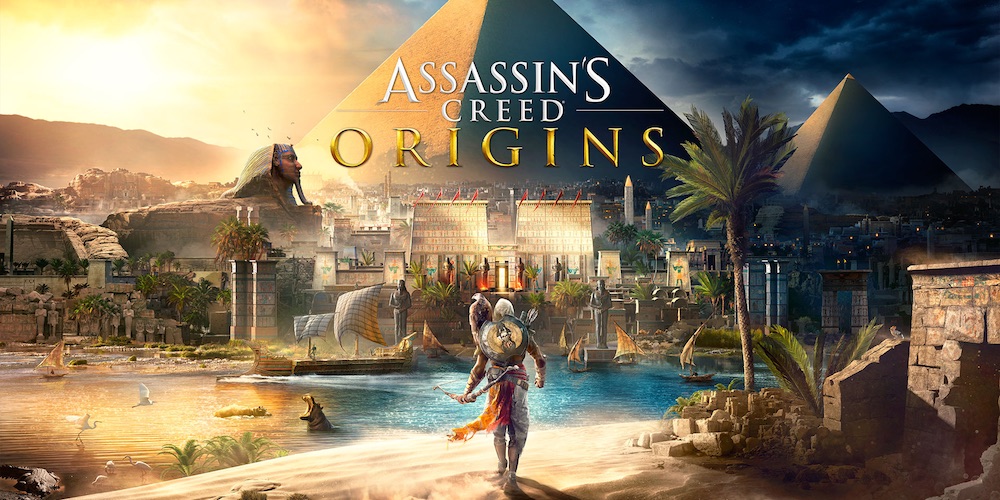
I’m going to be a bit bold here, so hold onto your respective hats: Assassin’s Creed: Syndicate is the best game in the series prior to Origins. Okay, that might not be too bold, but as an Assassin’s Creed lifer – which means I’ve played every release in the series and will keep blindly playing them if they’re still being churned out – I consider Syndicate to be even better than Black Flag and Assassin’s Creed 2, which were my previous favourites by a long shot.
In my opinion, it had better combat and the most functional climbing system yet – but, most importantly, 19th century London was nothing short of fantastic to experience, and the twins you played as were the best characters in the series since the almighty Ezio. So, since Ubisoft actually put some time into developing Origins; since early 2014, believe it or not (I was surprised to hear that too – Ubisoft, of all people!) I was super, super keen to play it. I won’t babble on about the same issues that everyone else does – yes, we all know Ubisoft turned AC into a cash cow of FIFA proportions and rolled out the releases far too quickly – but since three long years have been devoted to Origins’ development, I was expecting big things. And, you know what? It might even overtake Syndicate as my new favourite.
Origins is not named Origins for any abstract reason. Set during the Ptolemaic period in Egypt – 48 BCE, specifically – the story follows the original formation of the Brotherhood of Assassins. However, the idea of this isn’t touched on until fairly late in the game, so in many ways, it’s a prequel of sorts. It very much has its own story to tell, and I found it refreshing that the normal Assassins storyline took a back seat for once. I wouldn’t go so far to say that the Assassins vs. Templar storyline is getting tiring, but a pause is appreciated.
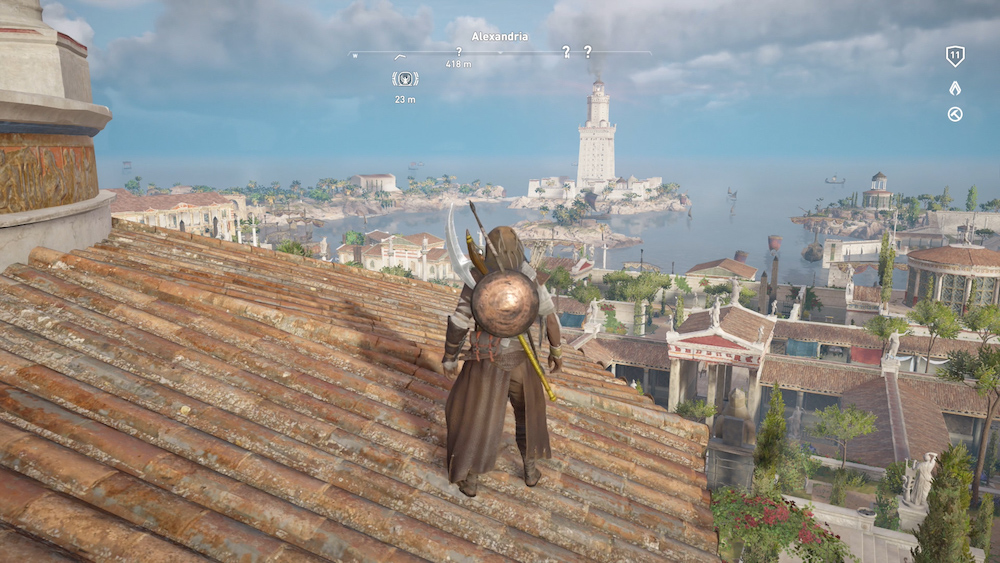
This time around you’re playing as Bayek, who’s a Medjay. The Medjay were an “elite paramilitary police force” in the real world (according to Wikipedia, anyway) but here are portrayed as a general helper of the people and keeper of the peace. You also play as Bayek’s wife, Aya, who’s a Medjay as well – and together, they’re some of the last to exist.
The story itself is hastily introduced at the start. Going in, I didn’t really have an idea of what was going on as the prelude tries to explain a lot (with hardly any dialogue) in only a few minutes. This is eventually rectified, and it becomes clearer after several hours, but it was a strange way to start.
At the heart of it, it’s a vengeance story. I know that’s overdone and is a bit groan-worthy, but it integrates itself well into the world of classical antiquity and all that happened within. Bayek and Aya’s goal is to find the killer of their son, Khemu and avenge his death. This leads them to a shadowy group of figures who call themselves “The Order,” who are a collection of people in high positions of power. Bayek and Aya knock them off one by one until they find their target – so, it’s a similar approach to the Templars in many ways.
Bayek himself is quite a likeable character, although you spend a bit too much time feeling sorry for him. I’m not sure if I like him so much because of pity, but even if the story does seem a bit generic on the surface, I found myself rooting for him once the game started rolling. He is quite charismatic after all, and his interactions with many of the strange folk within the Egypt of old are commonly entertaining. Like most Assassin’s games focusing on a specific period, big names of the time also appear throughout such as Julius Caesar and Cleopatra.
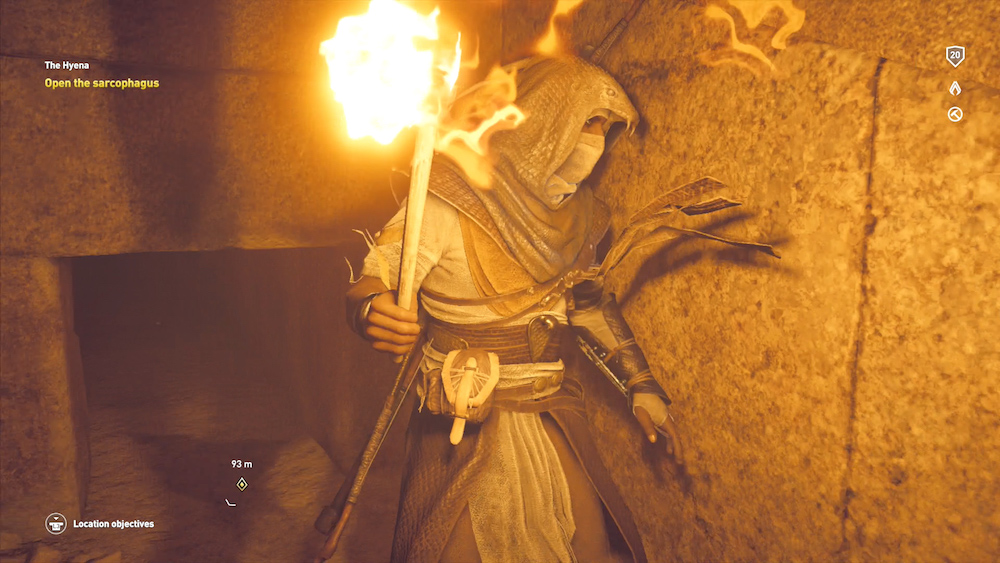
Like always, there is an element of the modern-day happening consecutively with the main storyline. This doesn’t appear until about three and a half hours into the campaign, and as a whole, I can take it or leave it. If it wasn’t there, a gape in the storyline would not appear. While a familiar friendly face does eventually emerge from the OG Desmond story arch, most of it is centred around a new character named Layla who works for Abstergo’s Historical Research Division. I feel some have been a bit too harsh on poor Layla as many saw these sections in the game unnecessary. While that is true for the most part, there is plenty of background information available to read on her laptop that tells an interesting story. The major issue I have, though, is that her story is never properly finalised – it abruptly ends after the final credits roll. Or, at least as far as I can tell – having finished the main storyline and sunk around 35 hours into the game.
That does highlight a major positive point for Origins, though; this game is unequivocally huge. And that 35-hour figure more or less means the entirety of the main storyline because of how the game is set out. Incorporating a levelling-up system, missions can be locked if you’re not at a certain level. This forces you to put some time into gaining XP which can be obtained from grinding if you want – however, by far the easiest and most enjoyable way to do that is by completing side missions. I saw this as a clever way to scale the levelling system up as the game progresses, but as an aside, the side missions actually end up taking up the largest chunk of the gameplay.
Looking back on my time playing Origins, most of it was spent playing the side missions – and that’s by no means a bad thing. They introduce many characters and settings of old Egypt, and it’s simply the best way to be immersed in that world. The missions are a bit samey, though. Most involve finding something for someone or going somewhere and killing someone else, but I can’t reiterate enough how much the characters and setting created for Origins make these all the more playable.
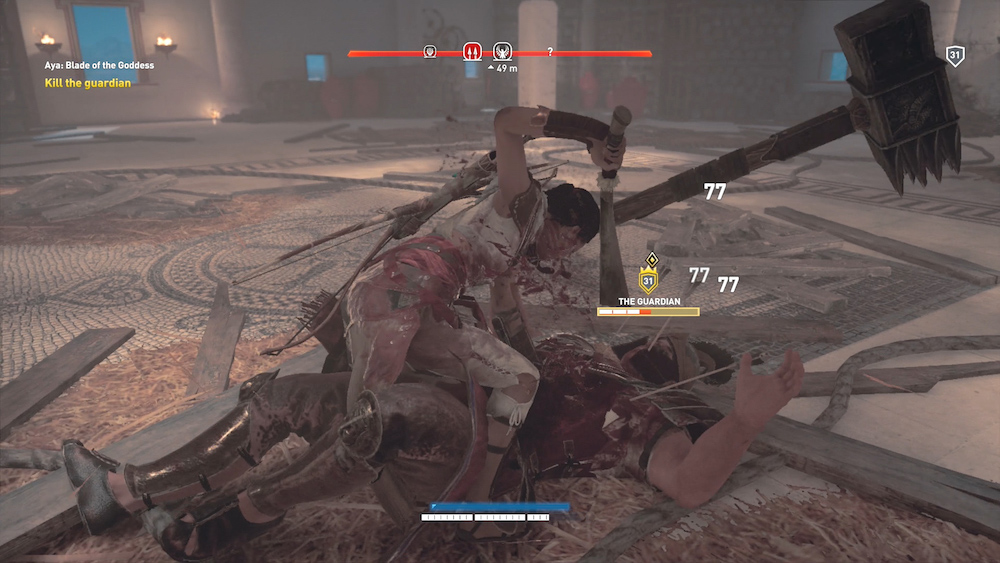
Like all Assassin’s games, Origins involves quite a lot of combat. Being set so long ago, more recent staples of the series like one shot pistols or rifles are excluded for obvious reasons. However, there is more of an emphasis on bows again and the close-range weapons. These get cooler as you level up – usually by introducing fire. Fire is a huge part of Origins as Egypt seems to be quite flammable. The fire is quite dynamic as a short burst of it on something can quickly turn into a sizeable blaze as it increases in size and gets a little bit out of control. Needless to say, by the end of my time with Origins, I was playing with a large pouch of firebombs and a sword that was ablaze, as well as arrows with lit tips. Bayek was basically an unstoppable fireball.
While the weapons menus are super easy to use and upgrade, I found the system for switching weapons mid-combat frustrating. I don’t know what it is, but if you’re not in combat, it switches right away. During the heat of it, however, it is so unresponsive and clunky that I would start to rapidly lose health. There doesn’t seem to be an easy way to switch weapons but keep defending yourself effectively – you’d more or less have to run away and then come back.
I’m happy to report that the combat itself is pretty good at least, although I found it was easier to time my dodges rather than directly defend against attacks using the shields. Another problem, too, is with the animations. There would be plenty of times where I’d already killed a foe, but I’d have to wait for Bayek’s attacking animation to complete. Not a huge issue in the scheme of things, but it was a bit funny to watch him attack nothing but the ground while grunting. There are plenty of animals scattered around as well – most of which are also keen for a fight. Once killed, they can be used as materials for upgrades. However, it is usually easier to just buy these from a shop and save some time.
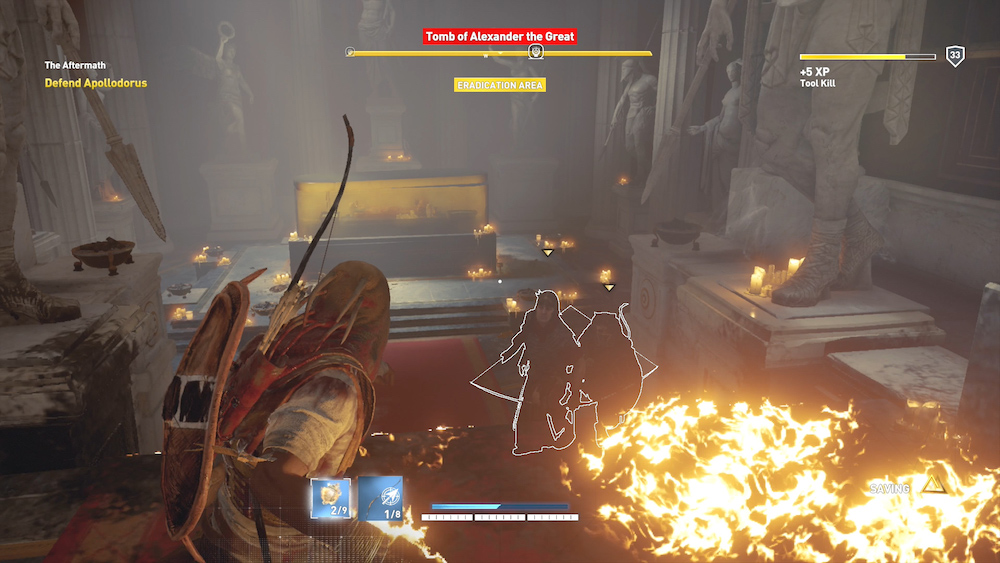
Something I found to be greatly improved in Syndicate is the climbing system, and thankfully, this has been transferred into Origins. While still not perfect – there was the odd occasion where I leapt off a wall by accident instead of continuing to climb (a problem that’s been in every Assassin’s, I’m sure) – I still found it enjoyable most of the time. There isn’t much Bayek can’t climb after all, and it’s super important for each mission.
As well as the side missions, there is a bunch of other fun stuff scattered about the expansive map. In keeping with the Roman influence of the time, chariot racing is included as well as gladiator battles. If you are not entertained by those, then why are you here? (Ugh, terrible joke. Sorry, everyone!)
Boat battles even make an appearance in the Aya oriented missions and are a lot of fun like always. If you’re after something a bit more lowkey, though, I personally found the Papyrus puzzles to be a nice break for the usual stabbing and fire. Usually found in temples, these documents try to cryptically explain the location of loot worth finding. Most aren’t all that hard to decipher, but it’s an easy way to quickly obtain some kickass gear.
The main new feature introduced in Origins (there’s always one – Syndicate had the grapple gun, for instance) is Bayek’s eagle. Named Senu, he largely replaces the eagle vision mode as you can fly him around manually, highlighting objectives and tagging enemies. He can even be used to help in combat later in the game. Working alongside that is Animus Pulse, which temporarily highlights items of interest (like treasure) surrounding Bayek.
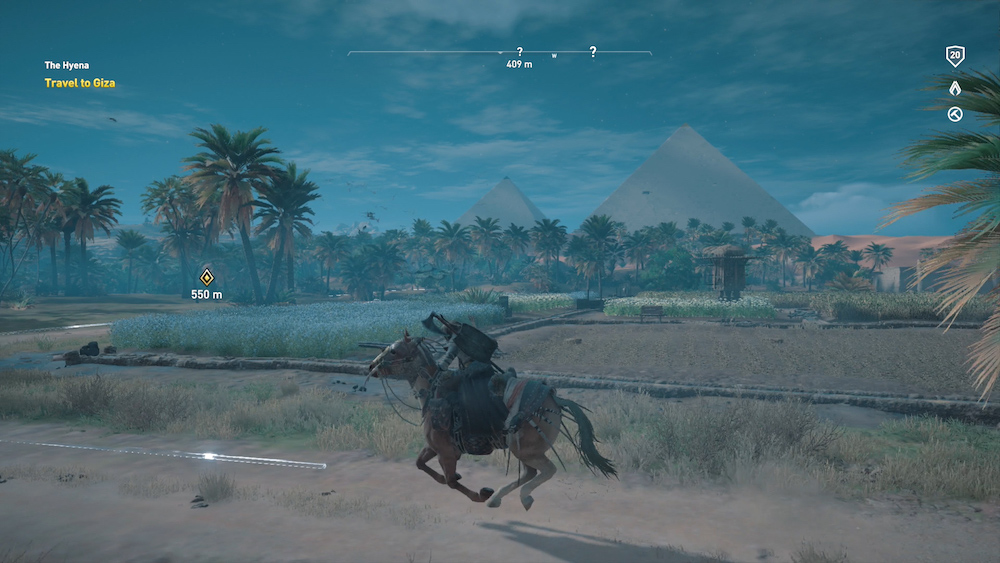
A long game requires a huge environment, and this depiction of Egypt does not disappoint. While there are sections that are a bit barren and sandy (they are deserts after all) most of the map is jam-packed full of things to do and see. There are distinct architectural changes as you go too, highlighting the groups of people who lived there at the time and conflicts that arise as a result. And as a plus, you get to slide down the Pyramids of Giza on your bum. You can’t fault that.
It was an interesting period of time to set the game, too – the Egyptians were in a period of turmoil thanks to a high turnover of rulers, and on top of everything, the Roman Empire was also present and causing problems. It should be noted that even though Origins is set 2000 years ago, it is still 2000 years after the Pyramids of Giza were built. That period of ancient Egypt was a very long time ago, and Origins puts that mass of time into perspective.
To traverse this great landscape, there are horses, camels and boats. If you need to get somewhere quickly, then there are of course the quick travel points that can be activated by climbing something high and synchronising, followed by a long casual dive headfirst into a pile of hay. There were some issues with long loadings time at certain points (like when you first start a gaming session), but for the most part, it was reasonable. You’ll have to sit through a loading screen if you fly too far away as Senu, though, so be mindful of that.
As expected, the graphics are on par for an environment that large on current hardware. It didn’t blow me away, but there were a few highlights including the sand and water. In fact, nature is quite well crafted overall in Origins, and you can tell that extra effort has been put into it. What really impressed, though, is the music. It has this epic, ’80s sci-fi ring to it – reminiscent of Stranger Things in a way (are we still allowed to compare things to that intro theme?) but that is also mixed with a more traditional, folk vibe. It’s a combination that has been composed well.
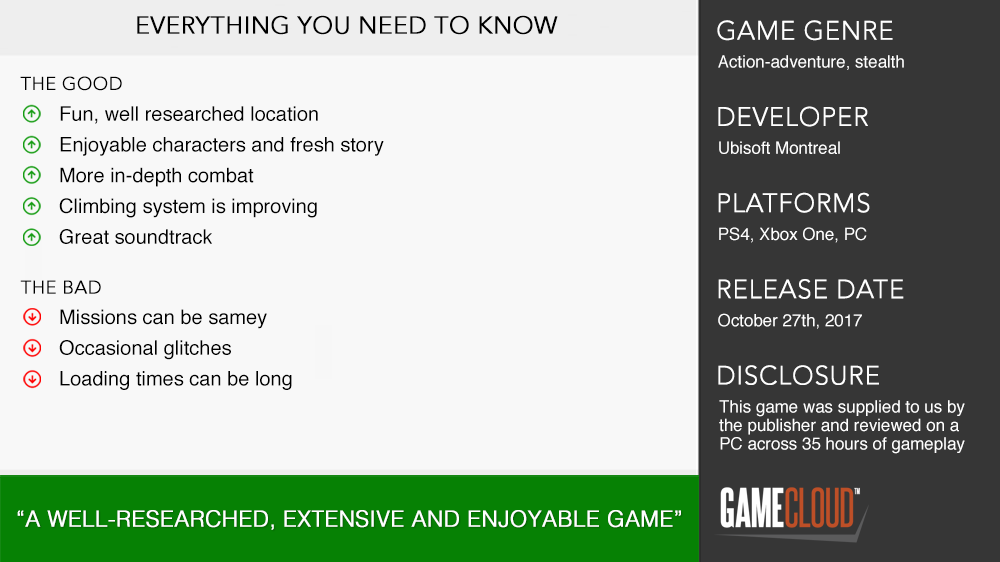
Is Origins my new favourite Assassin’s Creed? It is, yes. I think so. While it’s certainly not perfect due to the glitches you’ll sometimes encounter (though nothing of Unity proportions) and the samey gameplay which feels very familiar, it’s still an experience I enjoyed wholeheartedly. This all comes down to the characters and setting. It’s obvious a lot of research has been put into the time and place. As an example, remember the recent news of a new void found in a pyramid? That was already in Origins before the news broke. The devs based the level design of how they were built by a theory devised by a French architect named Jean-Pierre Houdin. I guess it’s no longer a theory since Houdin was seemingly correct with his hypothesis, but it’s a great example of the research that went into Origins. So please Ubisoft, keep the several year development cycle for Assassin’s Creed – it’s doing wonders for the series.











